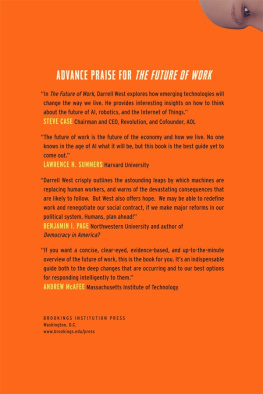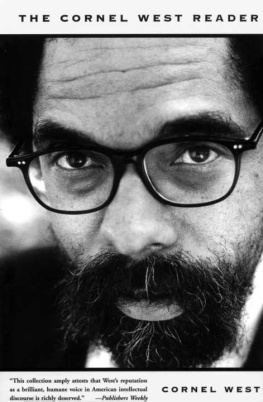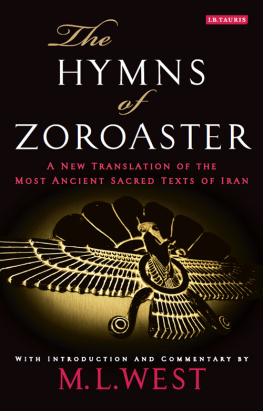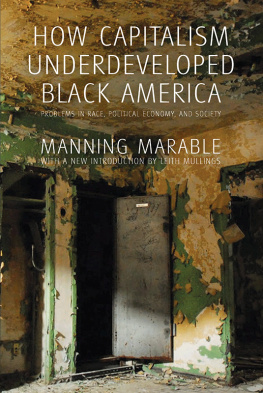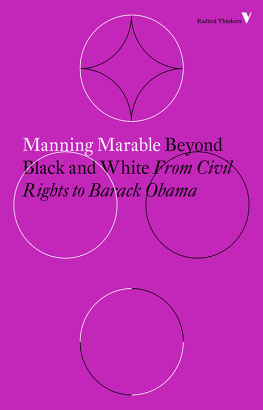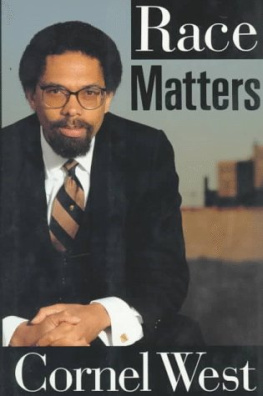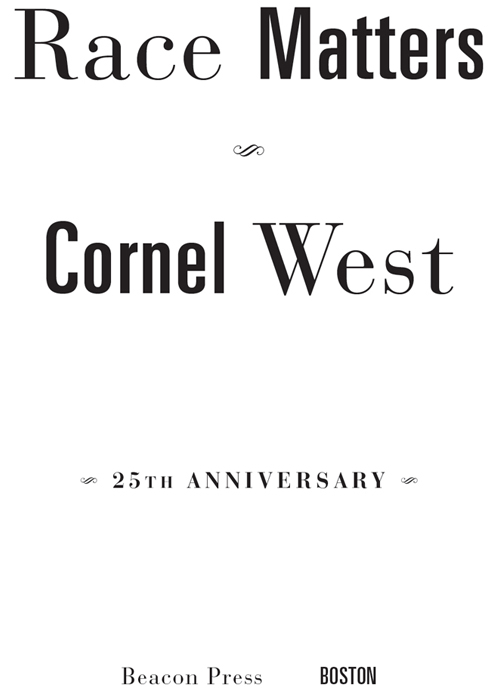
To my wonderful son
CLIFTON LOUIS WEST
who combats daily the hidden injuries of race
with the most potent of weapons
love of self and others
Contents
B LACK people in the United States differ from all other modern people owing to the unprecedented levels of unregulated and unrestrained violence directed at them. No other people have been taught systematically to hate themselvespsychic violencereinforced by the powers of state and civic coercionphysical violencefor the primary purpose of controlling their minds and exploiting their labor for nearly four hundred years. The unique combination of American terrorismJim Crow and lynchingas well as American barbarismslave trade and slave laborbears witness to the distinctive American assault on black humanity. This vicious ideology and practice of white supremacy has left its indelible mark on all spheres of American lifefrom the prevailing crimes of Amerindian reservations to the discriminatory realities against Spanish-speaking Latinos to racial stereotypes against Asians. Yet the fundamental litmus test for American democracyits economy, government, criminal justice system, education, mass media, and cultureremains: how broad and intense are the arbitrary powers used and deployed against black people. In this sense, the problem of the twenty-first century remains the problem of the color line.
The basic aim of a democratic regime is to curb the use of arbitrary powersespecially of government and economic institutionsagainst its citizens. Based on this uncontroversial criterion, the history of American democracy in regard to black people from 1776 to 1965 was a colossal failure. This also holds for red, brown, and yellow peoples. For one generationthirty-five yearswe have embarked on a multiracial democracy with significant breakthroughs and glaring silences.
Racial progress is undeniable in America. Never before have we had such a colorful menagerie of professionals in business, education, politics, sports, and the labor movement. Glass ceilings have been piercednot smashedby extraordinary persons of color. Overt forms of discrimination have been attacked and forced to become more covert.
Yet the legacy of white supremacy lingersoften in the face of the very denials of its realities. The most visible examples are racial profiling, drug convictions (black people consume 12 percent of illegal drugs in America yet suffer nearly 70 percent of its convictions!), and death-row executions. And the less visible ones are unemployment levels, infant mortality rates, special education placements, and psychic depression treatments.
The most immediate consequence of the recent experience of multiracial democracy is increasing class division and distance in American society and black communities. This is so primarily because the advent of the multiracial American regime coincided with escalating levels of wealth inequality. The new inclusion of people of color within the professional slices of American society occurred alongside the expansion of unaccountable corporate power in the economy and government and the unleashing of arbitrary police power in poor communities of color, especially black, brown, and red. The result is black-middle class achievements that constitute black progress alongside devastated black working and poor communities that yield unprecedented increases in prison populations and overlooked victims of police abuse. Decrepit schools, inadequate health care, unavailable childcare, and too few jobs with a living wage set the stage for this social misery.
Democracy matters in race matters because class and gender matter in American society and black life. Wealth inequality (the top 1 percent have wealth equivalent to the bottom 95 percent, or 48 percent of the financial net wealth in the country!) tips the balance against fair opportunity in education, employment, and other crucial life-chances. Corporate powerwith its plutocratic, patriarchal, and pigmentocratic realitieslessens the abilities of citizens and workers to have a meaningful voice in shaping their destiny. Police powerdisproportionately used against poor communities of colorrequires just and fair regulation if it is not to be viewed as illegitimate and arbitrary.
The major culprit of democratic possibilities here and abroad is the ever-expanding market culture that puts everything and everyone up for sale. The expansion of corporate power is driven by this pervasive commercialization and commodification for two basic reasons. First, market activities of buying and selling, advertising and promoting weaken nonmarket activities of caring and sharing, nurturing and connecting. Short-term stimulation and instant titillation edge out quality relations and substantive community. Second, private aims trump public aspirations. Individual successsometimes at any cost by any meansdownplays fair and just transactions so workers and citizens power is weakened. And no democracy can survive, no matter how strong its markets are, without a serious public life and commitment to fairness and justice.
The kind of structural transformation we need is best represented by the forces of Ralph Nader, Al Sharpton, and Dolores Huerta. We have seen stirrings of this multiracial alliance of concerned citizens and neglected workers in Seattle, Philadelphia, Los Angeles, Harlem, and San Antonio. But I believe black progressives will play a disproportionate role.
The impact of the market culture on black life has been devastating. As Stanley Crouch rightly has noted, fifty years ago black communities were the most civilized and humane in Americahighly nurturing, caring, loving, and self-respecting behind the walls of American apartheid. The market invasion, including the ugly drug invasion, has transformed too many black neighborhoods into hoods, black civic communities into black uncivil combat zones. This transformation results from the double impact of strong market forces and vicious white supremacist (and male supremacist, heterosexist) stereotypes that disproportionately shape black perceptions and practice. Needless to say, this holds for American society as a whole. But for a hated and hunted people whose prize possessions have been subversive memory, personal integrity, and self-respect, to become captive to historical amnesia, materialistic obsessions, and personal accommodation for acceptance at any costs yields black nihilism and collective suicide.
The major tragedy of black America in the past decade or so is the low quality of black leadership and the relative inattention to the deep crisis of black youth. To put it bluntly, we simply do not have enough black leaders who love and respect black people enough to tell them the truthand trust them with the truth. We have too many black leaders who give in too quickly and sell out too easily. And, like Wednesday night at the Apollo Theater, most black folk know who is for real, committed, and serious, and who is not. But too often, the choice for high-quality leadership is limited. And we find ourselves between a rock and a hard place.
This is especially so in regard to black youth. With roughly 40 percent of black children living in poverty and almost 10 percent of all black young adult men in prison, we face a crisis of enormous proportions. Yet this crisis is not even a blip on the national radar screen of American politics. This is a shame and a disgraceand black leaders must bear some of the responsibility. How can black youth respect black leaders when their plight and predicament is so flagrantly ignored by the mainstreama mainstream that black leaders speak to and influence? With few exceptionsAl Sharpton, Marian Wright Edelman, the Black Radical Congress, the NAACPs ACT-SO programs for young people, and a few othersblack leadership tends to downplay the black youth realities at the expense of black professional advancement. Again, this priority is an issue of class and gender in black America. And it is now coming back to haunt black leaders.
Next page

